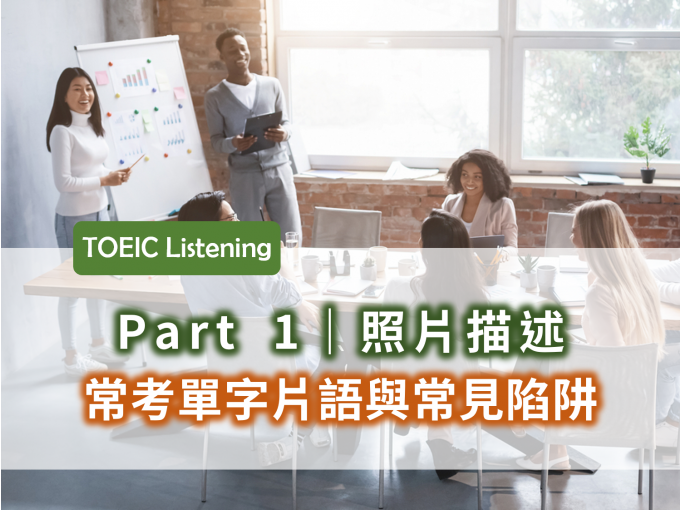一、常考動詞(按常考頻率排列)
|表示人:
1. be carrying... 推著/背著/搬著/抱著
《如》
The man is carrying some bricks. (這位男生正在搬磚。)
The man is carrying a suitcase. (這位男生正提著一個手提箱。)
The woman is carrying a baby. (這位女士正抱著一個小孩。 )
The woman is carrying a shopping cart. (這位女士正推著一台購物車。)
2. be holding... 拿著 / 握著 / 抓著
be holding 與 be carrying 的區別在於:
be holding 一般表示“手拿”,而be carrying的範圍更廣,不僅可以表示“手拿”,還可表示“肩扛、手推”等
《如》
They are holding a pack of cards. (他們正握著一副牌)
They are holding a file together. (他們一起拿著一份檔案)
The woman is holding an item of clothing. (這位女士正拿著一件衣服)
3. be looking through… 透過…看 / 閱讀
《如》
He is looking through the microscope at plant cells. (他正透過顯微鏡看植物細胞)
He is looking through the paper. (他正在看報紙。)
4. be browsing… 瀏覽 (網頁/商品)
《如》
He is browsing the Internet. (他正在瀏覽網頁)
He is browsing goods in the store. (他正在商店裡瀏覽商品)
免費領取多益程度分析:https://reurl.cc/kyvk1b
5. be adjusting... 調節 / 調試
《如》
He is adjusting his tie. (他正在整理領帶)
He is adjusting the instrument. (他正在調試儀器)
6. be strolling... 散步
《如》
They are strolling in the park. (他們在公園裡散步。)
7. be leaning against…背靠、斜靠
《如》
She is leaning against the wall. (她正靠著牆。)
|表示物:
1. be displayed... 展示 / 陳列
《如》
The books are displayed on the shelf. (書架上展示著書)
The goods are displayed in the showroom. (陳列室裡陳列著商品)
2. be arranged… 佈置好、排列整齊
《如》
The fruit are arranged and sorted. (水果已經分類並排好了)
The food are arranged on the floor. (食物被放到地板上了)
免費領取多益程度分析:https://reurl.cc/kyvk1b
3. pull into/ pull out of... 駛進 / 駛出
《如》
The train has pulled into the station. (火車已經駛進站了)
He has pulled his car out of the garage. (他把車從車庫裡開出來了)
4. be blocking… 擋住
《如》
The curtains are blocking the window. (窗簾把窗戶擋住了)
The stone is blocking the road. (石頭把路擋住了)
5. be hanging…掛著
《如》
The pictures are hanging on the wall. (牆上掛著畫)
The hats are hanging on the rack. (帽子掛在架子上)
二、常見陷阱(以下多為錯誤答案)
當描述包含以下內容時,常為錯誤答案:
|表示人:
1. 絕對性的內容:當主詞被絕對性的資訊修飾時,多為錯誤選項。
常見的絕對性資訊有every, all, both, each
《如》
All of the people are walking in the same direction. (所有的人都朝著一個方向走)
There are pictures hanging above each bed. (每張床上都掛著畫)
2. 推測性的內容:當主詞的時態表示推測資訊時,多為錯誤選項。
常見的「表推測的時態」有“過去式”、“將來式”和“現在完成式”等。
《如》
The woman has bought the clothes. (這位女士已經買了這件衣服)
The woman is going to buy the clothes. (這位女士將會買這件衣服)
The woman is about to buy the clothes. (這位女士打算買這件衣服)
免費領取多益程度分析:https://reurl.cc/kyvk1b
3. 瞬間完成的內容:當述語為瞬間動詞時,多為錯誤選項。
瞬間動詞常常成對出現,常見的瞬間動詞有:
get on / get off (上車 / 下車)
get in / get out off (進去 / 出來)
put on / take off (穿上 / 脫下)
pull into / pull out off (駛進 / 駛出)
《如》
The train has pulled out of station. (火車駛出車站了)
People are getting out of the vehicles. (人們正從車裡出來)
People are getting off the bus. (人們正在下車)
|表示物:
1. 推測性訊息:當描述中包含推測性的資訊時,多為錯誤選項。
表示推測資訊的常見表達有 “should be done” 以及 “need to be done ”
《如》
The goods need to be stocked. (這些商品需要被保存起來)
The frozen food should be put into the fridge. (這些冷凍食品應該被放到冰箱裡)
2. 現在進行被動語態,當描述中包含現在進行被動語態,多為錯誤選項。
《如》
The flowers are being watered. (花正被澆水)
The goods are being displayed on the shelf. (商品正在被陳列在架子上)
免費領取多益程度分析:https://reurl.cc/kyvk1b
.png)
.png)
.png)
